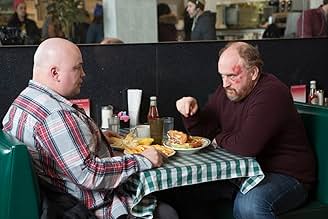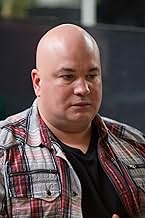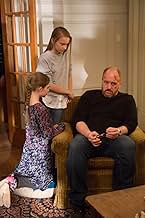La vida de Louie C.K., un comediante divorciado que vive en Nueva York con dos hijos.La vida de Louie C.K., un comediante divorciado que vive en Nueva York con dos hijos.La vida de Louie C.K., un comediante divorciado que vive en Nueva York con dos hijos.
- Ganó 3 premios Primetime Emmy
- 30 premios ganados y 109 nominaciones en total
Explorar episodios
Argumento
¿Sabías que…?
- TriviaThe series only shoots for three days per week. Louis C.K. has custody of his children for the rest of the week and refuses to shoot on those days. On those days, he edits the episodes while his children are at school. According to C.K., the crew dislikes the schedule but has to accept it.
- ConexionesFeatured in Writer's Draft: Louis C.K. of Louie (2010)
Opinión destacada
Seinfeld revolved around a stand-up comedian constantly sabotaged by the catastrophic social faux pas of himself and the people inextricably involved in his life, intercut with performance sets by the actual comic. So is Louie. But where Seinfeld was purportedly "a show about nothing," Louie is a show in which from moment to moment, you can safely expect nothing. Not only does Louis C.K. straddle the gaps in social protocol and everyday confrontations we all understand, but also the extremes of comedy and tragedy. It's a gallows comedy, in which we can find ourselves laughing in elation at the both wry and surreal absurdity of one moment, then clenching our chair arms in both tension and incredulity at moments of agonizing pain and even at times a true sense of impending brutality.
There is no continuity from one episode to the next, or even from one vignette to the next. Each episode is comprised of usually two scenarios book-ended by stand-up sets by Louie, which may or may not turn out to be part of one of the scenes. It's the direct inversion by an observant everyman's misanthrope of the TV sitcom. Whereas every sitcom we've ever seen has one essential soundstage, an ongoing play-like farce that runs before two cameras, all the same characters show up and everything not only works out but is just the same as before by the end, each week Louie will give a stream of consciousness an unsystematic narrative silhouette almost invariably a sequence of encounters with characters who enter and exit, yet very few ever return. Some actors and actresses return in different roles. Louie's mother is at one point played by an old woman as an appalling malignant narcissist and in another episode a humble, warm-hearted young working-class woman.
The show is written, directed and edited by its star, and he creates a visually realistic look and atmosphere for his small stories, captured quite cinematically. In the God episode, arguably the boldest, most powerful episode, he injects solemn amber tones, almost I dare say comparable to Gordon Willis' work on the Godfather films. There is a considerable proliferation of long takes in which two characters will share dialogue that sounds and feels no less real than that which we'll share with someone tomorrow. Sometimes, he's bold enough to prolong a single, stationary take in which nothing is being said on-camera, but all the action that affects the character in the shot is occurring off-camera, and in that very single take, we're carried seamlessly and steadily from deadpan absurdity to genuine terror. Then comes the cut: Life goes on; nothing's really that big of a deal. Simply put, each week, C.K. delivers one or two of the most powerful and memorable short films you may ever see.
There is no continuity from one episode to the next, or even from one vignette to the next. Each episode is comprised of usually two scenarios book-ended by stand-up sets by Louie, which may or may not turn out to be part of one of the scenes. It's the direct inversion by an observant everyman's misanthrope of the TV sitcom. Whereas every sitcom we've ever seen has one essential soundstage, an ongoing play-like farce that runs before two cameras, all the same characters show up and everything not only works out but is just the same as before by the end, each week Louie will give a stream of consciousness an unsystematic narrative silhouette almost invariably a sequence of encounters with characters who enter and exit, yet very few ever return. Some actors and actresses return in different roles. Louie's mother is at one point played by an old woman as an appalling malignant narcissist and in another episode a humble, warm-hearted young working-class woman.
The show is written, directed and edited by its star, and he creates a visually realistic look and atmosphere for his small stories, captured quite cinematically. In the God episode, arguably the boldest, most powerful episode, he injects solemn amber tones, almost I dare say comparable to Gordon Willis' work on the Godfather films. There is a considerable proliferation of long takes in which two characters will share dialogue that sounds and feels no less real than that which we'll share with someone tomorrow. Sometimes, he's bold enough to prolong a single, stationary take in which nothing is being said on-camera, but all the action that affects the character in the shot is occurring off-camera, and in that very single take, we're carried seamlessly and steadily from deadpan absurdity to genuine terror. Then comes the cut: Life goes on; nothing's really that big of a deal. Simply put, each week, C.K. delivers one or two of the most powerful and memorable short films you may ever see.
- jzappa
- 3 abr 2011
- Enlace permanente
Selecciones populares
Inicia sesión para calificar y agrega a la lista de videos para obtener recomendaciones personalizadas
Detalles
- Fecha de lanzamiento
- País de origen
- Idioma
- También se conoce como
- Луї
- Locaciones de filmación
- The Beaumont, 730 Riverside Drive, Harlem, Manhattan, Nueva York, Nueva York, Estados Unidos(Louie's apartment, season 2-)
- Productoras
- Ver más créditos de la compañía en IMDbPro
Contribuir a esta página
Sugiere una edición o agrega el contenido que falta
































